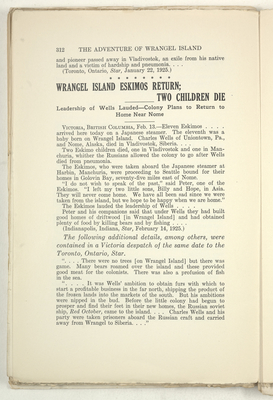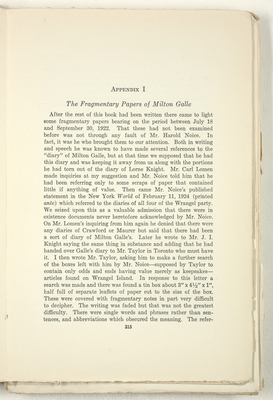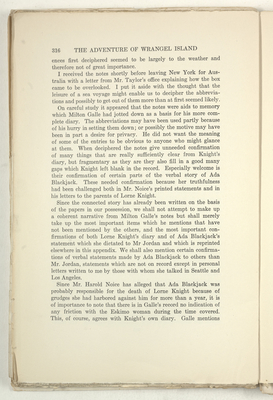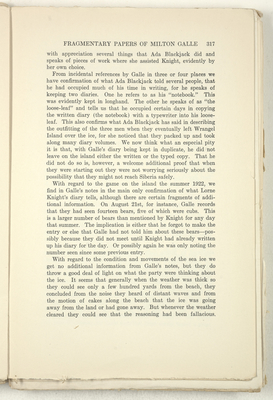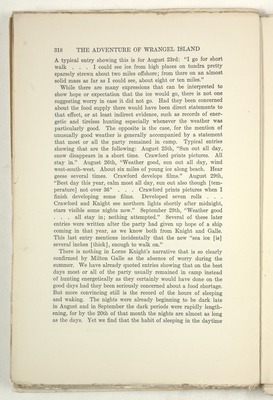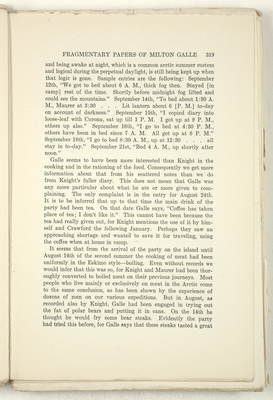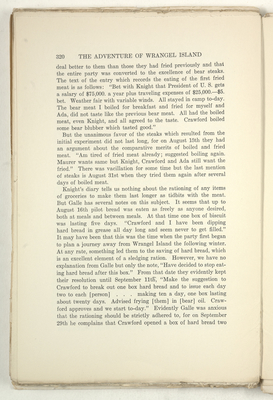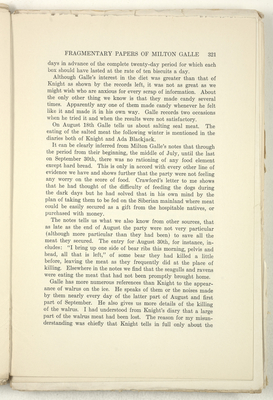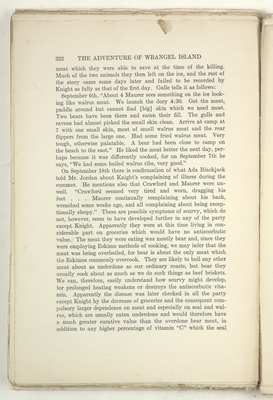Pages That Need Review
stefansson-wrangel-09-32
stefansson-wrangel-09-32-054v
312 THE ADVENTURE OF WRANGEL ISLAND
and pioneer passed away in Vladivostok, an exile from his native land and a victim of hardship and pneumonia. . . .
(Toronto, Ontario, Star, .)
WRANGEL ISLAND ESKIMOS RETURN; TWO CHILDREN DIE
Leadership of Wells Lauded—Colony Plans to Return to Home Near Nome
Victoria, British Columbia, Feb. 13.—Eleven Eskimos .... arrived here today on a Japanese steamer. The eleventh was a baby born on Wrangel Island. Charles Wells of Uniontown, Pa., and Nome, Alaska, died in Vladivostok, Siberia. . . .
Two Eskimo children died, one in Vladivostok and one in Manchuria, whither the Russians allowed the colony to go after Wells died from pneumonia.
The Eskimos, who were taken aboard the Japanese steamer at Harbin, Manchuria, were proceeding to Seattle bound for their homes in Golovin Bay, seventy-five miles east of Nome.
“I do not wish to speak of the past,” said Peter, one of the Eskimos. “I left my two little sons, Billy and Hope, in Asia. They will never come home. We have all been sad since we were taken from the island, but we hope to be happy when we are home.”
The Eskimos lauded the leadership of Wells ....
Peter and his companions said that under Wells they had built good homes of driftwood (in Wrangel Island) and had obtained plenty of food by killing bears and by fishing ....
(Indianapolis, Indiana, Star, .)
The following additional details, among others, were contained in a Victoria despatch of the same date to the Toronto, Ontario, Star.
“. . . There were no trees (on Wrangel Island) but there was game. Many bears roamed over the island and these provided good meat for the colonists. There was also a profusion of fish in the sea.
'... It was Wells’ ambition to obtain furs with which to start a profitable business in the far north, shipping the product of the frozen lands into the markets of the south. But his ambitions were nipped in the bud. Before the little colony had begun to prosper and find their feet in their new homes, the Russian soviet ship, Red October, came to the island. . . . Charles Wells and his party were taken prisoners aboard the Russian craft and carried away from Wrangel to Siberia. . . .”
stefansson-wrangel-09-32-056r
APPENDIX I
The Fragmentary Papers of Milton Galle
After the rest of this book had been written there came to light some fragmentary papers bearing on the period between July 18 and . That these had not been examined before was not through any fault of Mr. Harold Noice. In fact, it was he who brought them to our attention. Both in writing and speech he was known to have made several references to the “diary” of Milton Galle, but at that time we supposed that he had this diary and was keeping it away from us along with the portions he had torn out of the diary of Lorne Knight. Mr. Carl Lomen made inquiries at my suggestion and Mr. Noice told him that he had been referring only to some scraps of paper that contained little if anything of value. Then came Mr. Noice’s published statement in the New York World of (printed ante) which referred to the diaries of all four of the Wrangel party. We seized upon this as a valuable admission that there were in existence documents never heretofore acknowledged by Mr. Noice. On Mr. Lomen’s inquiring from him again he denied that there were any diaries of Crawford or Maurer but said that there had been a sort of diary of Milton Galle’s. Later he wrote to Mr. J. I. Knight saying the same thing in substance and adding that he had handed over Galle’s diary to Mr. Taylor in Toronto who must have it. I then wrote Mr. Taylor, asking him to make a further search of the boxes left with him by Mr. Noice—supposed by Taylor to contain only odds and ends having value merely as keepsakes— articles found on Wrangel Island. In response to this letter a search was made and there was found a tin box about 3" x 41/2" x 1", half full of separate leaflets of paper cut to the size of the box. These were covered with fragmentary notes in part very difficult to decipher. The writing was faded but that was not the greatest difficulty. There were single words and phrases rather than sentences, and abbreviations which obscured the meaning. The refer-
315
stefansson-wrangel-09-32-056v
316 THE ADVENTURE OF WRANGEL ISLAND
ences first deciphered seemed to be largely to the weather and therefore not of great importance.
I received the notes shortly before leaving New York for Australia with a letter from Mr. Taylor's office explaining how the box came to be overlooked. I put it aside with the thought that the leisure of a sea voyage might enable us to decipher the abbreviations and possibly to get out of them more than at first seemed likely.
On careful study it appeared that the notes were aids to memory which Milton Galle had jotted down as a basis for his more complete diary. The abbreviations may have been used partly because of his hurry in setting them down; or possibly the motive may have been in part a desire for privacy. He did not want the meaning of some of the entries to be obvious to anyone who might glance at them. When deciphered the notes give unneeded confirmation of many things that are really sufficiently clear from Knight's diary, but fragmentary as they are they also fill in a good many gaps which Knight left blank in the record. Especially welcome is their confirmation of certain parts of the verbal story of Ada Blackjack. These needed confirmation because her truthfulness had been challenged both in Mr. Noice's printed statements and in his letters to the parents of Lorne Knight.
Since the connected story has already been written on the basis of the papers in our possession, we shall not attempt to make up a coherent narrative from Milton Galle's notes but shall merely take up the most important items which he mentions that have not been mentioned by the others, and the most important confirmations of both Lorne Knight's diary and of Ada Blackjack's statement which she dictated to Mr Jordan and which is reprinted elsewhere in this appendix. We shall also mention certain confirmations of verbal statements made by Ada Blackjack to others than Mr. Jordan, statements which are not on record except in personal letters written to me by those with whom she talked in Seattle and Los Angeles.
Since Mr. Harold Noice has alleged that Ada Blackjack was probably responsible for the death of Lorne Knight because of grudges she had harbored against him for more than a year, it is of importance to note that there is in Galle's record no indication of any friction with the Eskimo woman during the time covered. This, of course, agrees with Knight's own diary. Galle mentions
stefansson-wrangel-09-32-057r
FRAGMENTARY PAPERS OF MILTON GALLE 317
with appreciation several things that Ada Blackjack did and speaks of pieces of work where she assisted Knight, evidently by her own choice.
From incidental references by Galle in three or four places we have confirmation of what Ada Blackjack told several people, that he had occupied much of his time in writing, for he speaks of keeping two diaries. One he refers to as his “notebook.” This was evidently kept in longhand. The other he speaks of as “the loose-leaf” and tells us that he occupied certain days in copying the written diary (the notebook) with a typewriter into his looseleaf. This also confirms what Ada Blackjack has said in describing the outfitting of the three men when they eventually left Wrangel Island over the ice, for she noticed that they packed up and took along many diary volumes. We now think what an especial pity it is that, with Galle’s diary being kept in duplicate, he did not leave on the island either the written or the typed copy. That he did not do so is, however, a welcome additional proof that when they were starting out they were not worrying seriously about the possibility that they might not reach Siberia safely.
With regard to the game on the island the summer 1922, we find in Galle’s notes in the main only confirmation of what Lome Knight’s diary tells, although there are certain fragments of additional information. On August 21st, for instance, Galle records that they had seen fourteen bears, five of which were cubs. This is a larger number of bears than mentioned by Knight for any day that summer. The implication is either that he forgot to make the entry or else that Galle had not told him about these bears—possibly because they did not meet until Knight had already written up his diary for the day. Or possibly again he was only noting the number seen since some previous entry.
With regard to the condition and movements of the sea ice we get no additional information from Galle’s notes, but they do throw a good deal of light on what the party were thinking about the ice. It seems that generally when the weather was thick so they could see only a few hundred yards from the beach, they concluded from the noise they heard of distant waves and from the motion of cakes along the beach that the ice was going away from the land or had gone away. But whenever the weather cleared they could see that the reasoning had been fallacious.
stefansson-wrangel-09-32-057v
318 THE ADVENTURE OF WRANGEL ISLAND
A typical entry showing this is for August 23rd: “I go for short walk ... I could see ice from high places on tundra pretty sparsely strewn about two miles offshore; from there on an almost solid mass as far as I could see, about eight or ten miles.”
While there are many expressions that can be interpreted to show hope or expectation that the ice would go, there is not one suggesting worry in case it did not go. Had they been concerned about the food supply there would have been direct statements to that effect, or at least indirect evidence, such as records of energetic and tireless hunting especially whenever the weather was particularly good. The opposite is the case, for the mention of unusually good weather is generally accompanied by a statement that most or all the party remained in camp. Typical entries showing that are the following: August 25th, “Sun out all day, snow disappears in a short time. Crawford prints pictures. All stay in.” August 26th, “Weather good, sun out all day, wind west-south-west. About six miles of young ice along beach. Hear geese several times. Crawford develops films.” August 29th, “Best day this year, calm most all day, sun out also though [temperature] not over 36° . . . Crawford prints pictures when I finish developing some films. Developed seven rolls . . . Crawford and Knight see northern lights shortly after midnight, stars visible some nights now.” September 29th, “Weather good . . . all stay in; nothing attempted.” Several of these later entries were written after the party had given up hope of a ship coming in that year, as we know both from Knight and Galle. This last entry mentions incidentally that the new “sea ice [is] several inches [thick], enough to walk on.”
There is nothing in Lorne Knight’s narrative that is so clearly confirmed by Milton Galle as the absence of worry during the summer. We have already quoted entries showing that on the best days most or all of the party usually remained in camp instead of hunting energetically as they certainly would have done on the good days had they been seriously concerned about a food shortage. But more convincing still is the record of the hours of sleeping and waking. The nights were already beginning to be dark late in August and in September the dark periods were rapidly lengthening, for by the 20th of that month the nights are almost as long as the days. Yet we find that the habit of sleeping in the daytime
stefansson-wrangel-09-32-058r
FRAGMENTARY PAPERS OF MILTON GALLE 319
and being awake at night, which is a common arctic summer custom and logical during the perpetual daylight, is still being kept up when that logic is gone. Sample entries are the following: September 12th, “We got to bed about 6 A. M., thick fog then. Stayed [in camp] rest of the time. Shortly before midnight fog lifted and could see the mountains.” September 14th, “To bed about 1:30 A. M., Maurer at 3:30 . . . Lit lantern about 6 [P. M.] to-day on account of darkness.” September 15th, “I copied diary into loose-leaf with Corona, sat up till 1 P. M. I got up at 9 P. M., others up also.” September 16th, “I go to bed at 4:30 P. M., others have been in bed since 7 A. M. All get up at 6 P. M.” September 18th, “I go to bed 8:30 A. M., up at 12:30 . . . all stay in to-day.” September 21st, “Bed 4 A. M., up shortly after noon.”
Galle seems to have been more interested than Knight in the cooking and in the rationing of the food. Consequently we get more information about that from his scattered notes than we do from Knight’s fuller diary. This does not mean that Galle was any more particular about what he ate or more given to complaining. The only complaint is in the entry for August 24th. It is to be inferred that up to that time the main drink of the party had been tea. On that date Galle says, “Coffee has taken place of tea; I don’t like it.” This cannot have been because the tea had really given out, for Knight mentions the use of it by himself and Crawford the following January. Perhaps they saw an approaching shortage and wanted to save it for traveling, using the coffee when at home in camp.
It seems that from the arrival of the party on the island until August 14th of the second summer the cooking of meat had been uniformly in the Eskimo style—boiling. Even without records we would infer that this was so, for Knight and Maurer had been thoroughly converted to boiled meat on their previous journeys. Most people who live mainly or exclusively on meat in the Arctic come to the same conclusion, as has been shown by the experience of dozens of men on our various expeditions. But in August, as recorded also by Knight, Galle had been engaged in trying out the fat of polar bears and putting it in cans. On the 14th he thought he would fry some bear steaks. Evidently the party had tried this before, for Galle says that these steaks tasted a great
stefansson-wrangel-09-32-058v
320 THE ADVENTURE OF WRANGEL ISLAND
deal better to them than those they had fried previously and that the entire party was converted to the excellence of bear steaks. The text of the entry which records the eating of the first fried meat is as follows: “Bet with Knight that President of U. S. gets a salary of $75,000. a year plus traveling expenses of $25,000.—$5. bet. Weather fair with variable winds. All stayed in camp to-day. The bear meat I boiled for breakfast and fried for myself and Ada, did not taste like the previous bear meat. All had the boiled meat, even Knight, and all agreed to the taste. Crawford boiled some bear blubber which tasted good.”
But the unanimous favor of the steaks which resulted from the initial experiment did not last long, for on August 18th they had an argument about the comparative merits of boiled and fried meat. “Am tired of fried meat already; suggested boiling again. Maurer wants same but Knight, Crawford and Ada still want the fried.” There was vacillation for some time but the last mention of steaks is August 31st when they tried them again after several days of boiled meat.
Knight’s diary tells us nothing about the rationing of any items of groceries to make them last longer as tidbits with the meat. But Galle has several notes on this subject. It seems that up to August 16th pilot bread was eaten as freely as anyone desired, both at meals and between meals. At that time one box of biscuit was lasting five days. “Crawford and I have been dipping hard bread in grease all day long and seem never to get filled.” It may have been that this was the time when the party first began to plan a journey away from Wrangel Island the following winter. At any rate, something led them to the saving of hard bread, which is an excellent element of a sledging ration. However, we have no explanation from Galle but only the note, “Have decided to stop eating hard bread after this box.” From that date they evidently kept their resolution until September 11th, “Make the suggestion to Crawford to break out one box hard bread and to issue each day two to each [person] . . . making ten a day, one box lasting about twenty days. Advised frying [them] in [bear] oil. Crawford approves and we start to-day.” Evidently Galle was anxious that the rationing should be strictly adhered to, for on September 29th he complains that Crawford opened a box of hard bread two
stefansson-wrangel-09-32-059r
FRAGMENTARY PAPERS OF MILTON GALLE 321
days in advance of the complete twenty-day period for which each box should have lasted at the rate of ten biscuits a day.
Although Galle’s interest in the diet was greater than that of Knight as shown by the records left, it was not as great as we might wish who are anxious for every scrap of information. About the only other thing we know is that they made candy several times. Apparently any one of them made candy whenever he felt like it and made it in his own way. Galle records two occasions when he tried it and when the results were not satisfactory.
On August 18th Galle tells us about salting seal meat. The eating of the salted meat the following winter is mentioned in the diaries both of Knight and Ada Blackjack.
It can be clearly inferred from Milton Galle’s notes that through the period from their beginning, the middle of July, until the last on September 30th, there was no rationing of any food element except hard bread. This is only in accord with every other line of evidence we have and shows further that the party were not feeling any worry on the score of food. Crawford’s letter to me shows that he had thought of the difficulty of feeding the dogs during the dark days but he had solved that in his own mind by the plan of taking them to be fed on the Siberian mainland where meat could be easily secured as a gift from the hospitable natives, or purchased with money.
The notes tells us what we also know from other sources, that as late as the end of August the party were not very particular (although more particular than they had been) to save all the meat they secured. The entry for August 30th, for instance, includes: “I bring up one side of bear ribs this morning, pelvis and head, all that is left,” of some bear they had killed a little before, leaving the meat as they frequently did at the place of killing. Elsewhere in the notes we find that the seagulls and ravens were eating the meat that had not been promptly brought home.
Galle has more numerous references than Knight to the appearance of walrus on the ice. He speaks of them or the noises made by them nearly every day of the latter part of August and first part of September. He also gives us more details of the killing of the walrus. I had understood from Knight’s diary that a large part of the walrus meat had been lost. The reason for my misunderstanding was chiefly that Knight tells in full only about the
stefansson-wrangel-09-32-059v
322 THE ADVENTURE OF WRANGEL ISLAND
meat which they were able to save at the time of the killing. Much of the two animals they then left on the ice, and the rest of the story came some days later and failed to be recorded by Knight as fully as that of the first day. Galle tells it as follows: September 6th, “About 4 Maurer sees something on the ice looking like walrus meat. We launch the dory 4:30. Get the meat, paddle around but cannot find [big] skin which we need most. Two bears have been there and eaten their fill. The gulls and ravens had almost picked the small skin clean. Arrive at camp at 7 with one small skin, most of small walrus meat and the rear flippers from the large one. Had some fried walrus meat. Very tough, otherwise palatable. A bear had been close to camp on the beach to the east.” He liked the meat better the next day, perhaps because it was differently cooked, for on September 7th he says, “We had some boiled walrus ribs, very good.”
On September 18th there is confirmation of what Ada Blackjack told Mr. Jordan about Knight’s complaining of illness during the summer. He mentions also that Crawford and Maurer were unwell. “Crawford seemed very tired and worn, dragging his feet . . . Maurer continually complaining about his back,
wrenched some weeks ago, and all complaining about being exceptionally sleepy.” These are possible symptoms of scurvy, which do not, however, seem to have developed further in any of the party except Knight. Apparently they were at this time living in considerable part on groceries which would have no antiscorbutic value. The meat they were eating was mostly bear and, since they were employing Eskimo methods of cooking, we may infer that the meat was being overboiled, for bear is about the only meat which the Eskimos commonly overcook. They are likely to boil any other meat about as underdone as our ordinary roasts, but bear they usually cook about as much as we do such things as beef briskets. We can, therefore, easily understand how scurvy might develop, for prolonged heating weakens or destroys the antiscorbutic vitamin. Apparently the disease was later checked in all the party except Knight by the decrease of groceries and the consequent compulsory larger dependence on meat and especially on seal and walrus, which are usually eaten underdone and would therefore have a much greater curative value than the overdone bear meat, in addition to any higher percentage of vitamin “C” which the seal
stefansson-wrangel-09-32-060r
FRAGMENTARY PAPERS OF MILTON GALLE 323
and walrus may possess. Ada Blackjack has told us that as autumn advanced they began to eat the meat of foxes and that all liked it except Knight. This gives some explanation of why the scurvy developed in him more than the others, but it is a very strange thing and hard to believe because Knight was already used to fox meat. Many of the men of our expeditions have eaten fox meat and all those who have tried it have liked it after they got over their initial prejudices. So far as I can remember, Knight used to eat it with the rest of us the years 1914-1918, liking it as we did.
The most important part of Milton Galle’s notes (made so by later events) is what he says about the proposed trip to Nome, Alaska. We have confirmation here also of what Ada Blackjack has told about the way in which the party was managed. It had been the understanding when we planned the expedition the summer of 1921 that while Crawford was in command he was to be guided continually by the opinion of the veterans, Knight and Maurer. It was their own arrangement that Knight rather than Maurer should have the formal position of second-in-command. Ada Blackjack says that she frequently heard Crawford asking Knight what he thought ought to be done. There would follow long discussions after which Crawford would announce to the rest of the party what his orders or plans were.
The plan of making a journey to Alaska seems to have been formed in this way, for Galle’s first knowledge of it evidently came from chance remarks. About the only evidence of resentment in Galle’s notes appears in this connection. He knew that plans were being formed but did not know just what they were, and when he heard that a journey was to be made he was not told the reason for the journey. This naturally annoyed him. We infer from the fragmentary notes preserved that his fuller diaries probably contained not only more about his annoyance but also what his speculations were as to the purpose of the journey. There is a suggestion that he made these speculations partly as a sort of game —he was trying out his cleverness to see how nearly he could guess what the explanations would be when they eventually were given to him. This was a habit he had with regard to other and less important matters. Examples of that are the conjectures we find in his notes as to where the camp would be located for the second winter. He puts down his guesses and says that he will
